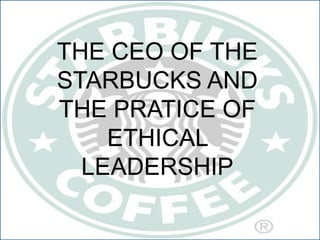Starbucks, the global coffee chain known for its iconic green mermaid logo, has a long history of prioritizing ethical practices in its business operations. However, like any large corporation, the company has faced its fair share of ethical dilemmas and controversies. In this case study, we will explore some of the ethical challenges that Starbucks has encountered and how the company has addressed them.
One of the most high-profile ethical issues that Starbucks has faced was the controversy over its tax practices in the UK. In 2012, it was revealed that Starbucks had paid very little in corporation tax in the UK over a period of several years, despite reporting significant profits. This led to widespread public outrage and accusations of tax avoidance.
In response to this controversy, Starbucks made a number of changes to its tax practices. The company began to pay higher amounts of corporation tax in the UK and other countries where it operates, and it also implemented a number of transparency measures to ensure that its tax practices were more transparent and accountable.
Another ethical issue that Starbucks has grappled with is the treatment of its workers. In the past, the company has faced criticism for its use of part-time and temporary workers, as well as for its policies on sick leave and benefits. In response to these concerns, Starbucks has made a number of changes to its policies to ensure that its workers are treated fairly and with respect. For example, the company has introduced policies to ensure that workers are paid a fair wage and receive benefits such as sick leave and health insurance.
In addition to these issues, Starbucks has also faced criticism for its environmental practices. In particular, the company has been criticized for its use of single-use plastic cups, which contribute to plastic pollution. In response to these concerns, Starbucks has implemented a number of initiatives to reduce its environmental impact, including the introduction of reusable cups and the development of more sustainable packaging materials.
Overall, it is clear that Starbucks has faced a number of ethical challenges throughout its history. However, the company has demonstrated a commitment to addressing these issues and improving its practices. By taking steps to address concerns about its tax practices, the treatment of its workers, and its environmental impact, Starbucks has shown that it is committed to upholding high ethical standards in its business operations.







